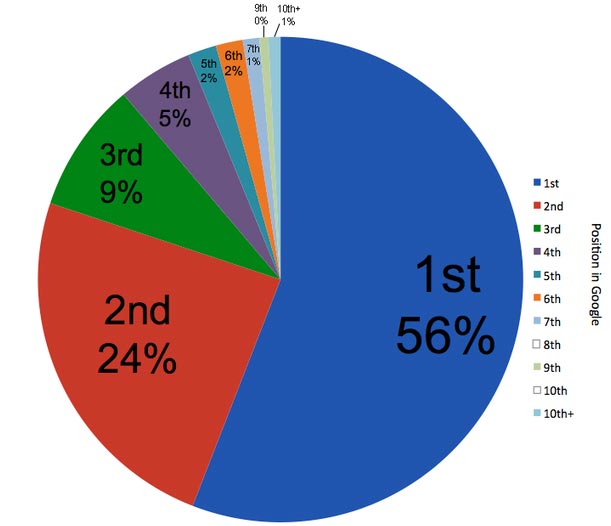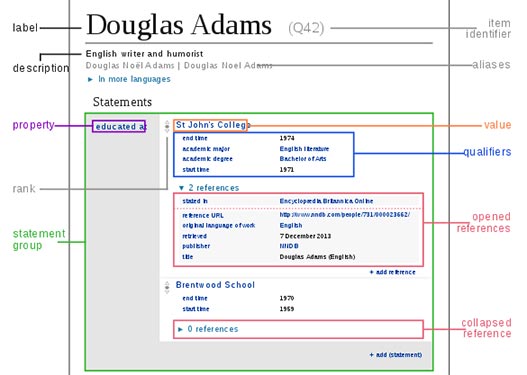WikiData – How and Why to Set Up and Maintain a WikiData Entry

- You may want to know how to create a Wiki article for your company, but if you can’t (most companies can’t), consider a WikiData article instead.
- WikiData articles are automatically created when a Wikipedia article is published, but a WikiData article can also be set up manually.
- Studies have shown that Wikipedia content ranks for 99% of Google searches, but WikiData is used by search engines to better understand the subject, be it a person, company, brand or concept.
- Wikidata doesn’t show up in search results directly. It doesn’t provide any inbound links. So why do it? It’s used by Google to better understand your business.
- Wikidata entries that are not relevant can be deleted by other editors, just like with Wikipedia.
- Setting up a WikiData article may seem intimidating at first glance, but Wikimedia made it easier by creating an easy-to-follow, step-by-step guide to make one.
What is a WikiData article?
There’s a reason Wikipedia content dominates search engine results articles (SERPs): it’s credible, recognized, and very SEO-friendly. And when we say dominate, we’re not using that term lightly.
A study in which 1,000 search terms (selected with a random noun generator) were analyzed, Wikipedia ranked the first article for an overwhelming 99% of searches. The majority ranked in the very first position on a topic’s SERP. This chart summarizes the findings of the study and shows Wikipedia’s position on Google for the 1,000 randomly-generated search terms. But Wikipedia has a little-known sibling known as WikiData that can serve your brand well.

Chart courtesy of Econsultancy.
Clearly, having Wikipedia content is crucial to your business developing a strong presence on the web if you can earn it. But Wikidata is where search engines pull data from.
Even if you do not have a Wikipedia article, you can probably have a WikiData article. That’s where setting up a WikiData article is important.
According to its Wikipedia article, WikiData is “a collaboratively edited multilingual knowledge graph hosted by the Wikimedia Foundation. It is a common source of open data that Wikimedia projects such as Wikipedia can use, and anyone else, under a public domain license.”
WikiData and the Knowledge Panel
The data in these articles represents key information about topics, concepts, or objects that could be search terms. More importantly, Google uses WikiData information – and many other sources – for its Knowledge Graph. The Knowledge Graph feeds the Knowledge Panel you often see in the upper right corner of search results (desktop) or on top in mobile searches. Not only do these articles contain that information, but they also have it in myriad languages.
Persistent identifier
Each WikiData article has a unique, persistent identifier that starts with the letter “Q” and ends in a positive integer — i.e. Elvis Presley (Q303) — known as a “QID.” This enables search engines to find the basic information required to identify a search topic. But the item labels (in the case of our example, “Elvis Presley”) do not have to be unique, just the QID and the Wikidata article’s description.
For example, Elvis Presley (Q303) represents data for Elvis himself, the American singer and actor, whereas Elvis Presley (Q610926) is data for his self-titled album. While an article’s label does not have to be unique, its description and QID must be to dissolve any ambiguity between homonymic search terms.
The following is an example of the top of a WikiData article:

Why should you set up a WikiData article?
WikiData has been highly relevant to how search engines display results for more than a decade, and it’s showing no signs of slowing down. Building a WikiData entry is not your starting point to prop up your overall Wikipedia profile. Creating a WikiData profile does not give you a Wikipedia article; in fact, it’s the opposite – creating a Wikipedia article creates a WikiData entry automatically. But you don’t have to have a Wikipedia article to have a WikiData profile for your brand. You can just create one to help search engines better understand your brand. It’s basically invisible but helps nonetheless.
Still, if you can earn a Wikipedia article, it is highly recommended. Here is a quick rundown as to why:
- Unique and in-depth content that ranks organically. Wikipedia articles are written around specific search terms and typically include relevant and related keywords and links that help them rank organically on SERPs. The nature of the content, matched with Wikipedia’s high domain authority, makes these articles nearly impossible to trump when it comes to SEO. Wikipedia is a well-established brand and a massive website. Data sources like WikiData help these articles remain reliable and authoritative, which means their high rankings don’t appear to be going anywhere.
- Excellent internal linking structure. Wikipedia is great at contextual linking internally. This allows Wikipedia to spread its domain strength throughout its site. It’s a brilliant formula that keeps Wikipedia content relevant on the web.
- Knowledge graphs. Appearing at the top right of search articles, Google’s Knowledge Panels give topics and information more visibility on SERPs. The data in these boxes are almost always taken from Wikipedia if a Wikipedia article exists.

WikiData shares some of the SEO benefits of having a Wikipedia article.
If a WikiData article for your business already exists, you should check it to see if there are ways you can improve your WikiData entry. When your company is getting the type of visibility on the web that Wikipedia articles can create, having your WikiData in order is a worthy investment.
We suggest looking at the WikiData entry for Apple Computer. It’s the template we often use when building out a client’s WikiData entry because it includes nearly every available option for a corporate client. That said, it’s probably a lot more inclusive than you’ll need for your brand.
How do you set up a WikiData article?
Setting up a WikiData article might seem like an arduous task at first glance, it is certainly an “intermediate” level exercise. But Wikimedia has created an easy-to-follow, step-by-step guide to setting up a WikiData article.
The major elements of WikiData articles that have been added are properties, values, and statements. In short, a property paired with a value forms a statement.
The statements section of a WikiData article stores the individual pieces of data about the entry that are taken from other Wiki sources.
Below, the WikiData entry for the world’s best author, Douglas Adams, is used as an example (at least, we think he’s the best).

On top of setting up the “bones” of your WikiData article, there are a few ways to optimize it:
- Use Wikipedia for your source of information as much as possible
- Learn from similar listings
- Add social media profiles
All of this may sound like a lot to set up and maintain, and it certainly takes a bit of time. A partnership with a digital services company can help take a lot of this work off your plate. From the opening stages of finding out if you’re eligible for a Wikipedia article to the granular work of ensuring your WikiData entry is optimized, uniting with a digitally savvy SEO company is a good way to ensure your Wiki content is up to snuff.
And to answer the inevitable question, does Reputation X edit Wikipedia articles? Yes, we do.
Combine WikiData with Schema for ultimate clarity
While a WikiData entry can help your brand alert Google to your address, coordinates, social profiles, parent company, subsidiaries, and more, pairing with on-site schema ties it all together.
We strongly recommend that after you’ve set up a WikiData entry for your brand, you create a website schema of the “organization” variety, including SameAs statements to make it obvious the WikiData entry is really about your brand.
To do this, use a WordPress plugin that creates website schema (free in most cases), or create it manually using a tool like this one. Select “organization” as the schema type, and when it asks for SameAs URLs (may be called Social) like your brands’ Facebook, LinkedIn, or Crunchbase profile, add one for your WikiData entry too.
Remember to test your schema using this tool to make sure it works right!
Conclusion
Once you learn how valuable WikiData content is across SERPs (Search Engine Results articles), the opportunity for quiet background SEO improvement becomes apparent.
Amid an increasingly competitive results article landscape, adding this layer of visibility can make a significant difference in a business’s web presence. If nothing else, the power and pervasiveness of Wikipedia’s content in the SERP rankings should serve as a reminder of how important domain authority, quality content (updated, readable, concise), and great internal linking is to acquiring and maintaining visibility on Google.
About the author
Kent Campbell is the chief strategist for Reputation X, an award-winning online reputation management agency. He has over 15 years of experience with SEO, Wikipedia editing, review management, and online reputation strategy. Kent has helped celebrities, leaders, executives, and marketing professionals improve the way they are seen online. Kent writes about reputation, SEO, Wikipedia, and PR-related topics.
–
Tags: Knowledge Panel, Wikipedia, Wikipedia Writing.
